Signal Vs. Telegram: Which Should You Choose?
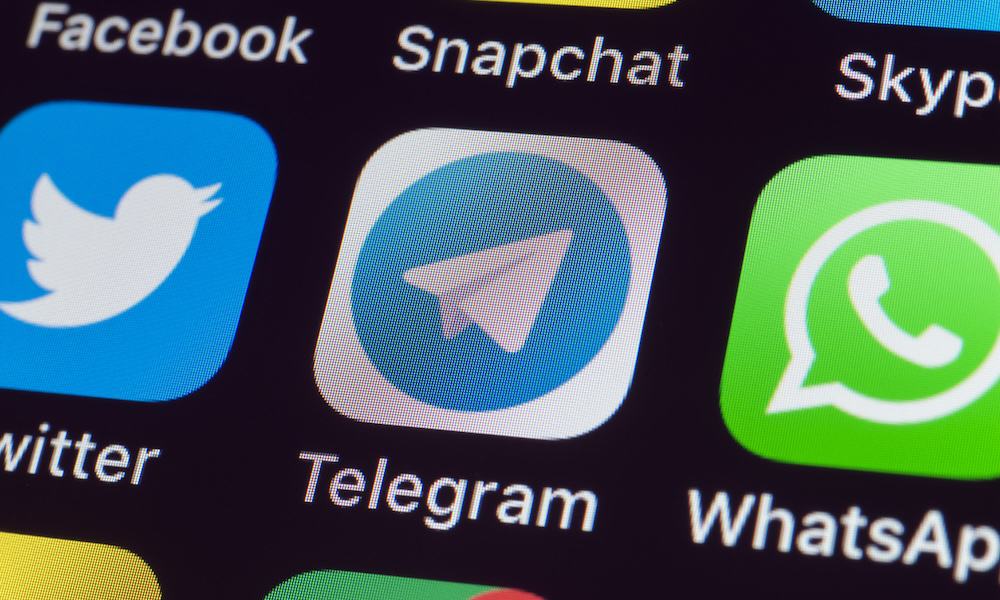
If you’re ready to ditch WhatsApp, which messaging app should you choose? We compare Signal vs. Telegram to see which is best.
WhatsApp is still one of the most popular messaging apps in the world, but when it changed its policies to become less private, people jumped ship in droves. Signal and Telegram were two of the new homes that many WhatsApp users found. Both apps offered more privacy and security than WhatsApp, and with both offering a great range of features, it was no surprise to see the number of users skyrocket.
If you’re thinking about leaving WhatsApp behind, you may be trying to choose between Signal and Telegram. If so, we’re here to help. Read on as we go head-to-head with Signal vs. Telegram.
Features
Whilst both messaging apps have a lot of the same core features, there are some key differences between them. We’ll look at the main features in turn and compare how both apps handle them.
Messaging
This is the central purpose of any messaging app. Both apps allow you to send messages directly to another user, but there is a key difference. Signal’s messages are end-to-end encrypted by default. That means that the only person who can read your message is the recipient; even Signal can’t see what it says.
Telegram’s messages are only encrypted between you and the server and the server and recipient. It means your message is stored unencrypted on Telegram’s servers and can be read by the company. You can opt to create a ‘secret chat’ in Telegram which provides full end-to-end encryption, but by default, your messages don’t have this level of protection.

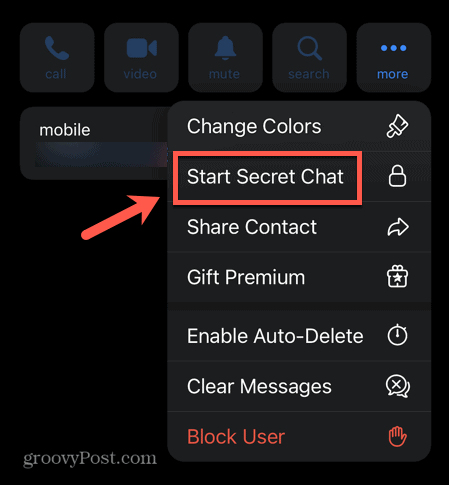
Group Chats
The same applies to group chats. Group chats in Signal are end-to-end encrypted by default, whereas Telegram’s are not, and there’s no option to make group chats ‘secret’ in Telegram. Where Telegram does have the edge is in chat size. Signal has a limit of 1,000 people in a group chat, which is more than enough for most people’s needs. Telegram users, however, can create chats of up to 200,000 people.
Voice and Video
Both apps offer voice and video calls, both individually and in groups. One-to-one calls are end-to-end encrypted in both Signal and Telegram. Signal also uses end-to-end encryption for group chats, but in Telegram, these calls are only encrypted between the device and the server, so they are less secure.
Security
One of the most important jobs a messaging app can do is to keep your messages secure. There’s no reason anyone, from governments to tech companies, should be able to read your private communications.
We’ve already seen that Signal is more secure by default when it comes to messaging. End-to-end encryption means that the only people who can read your messages are you and the person you’re sending them to. Telegram only encrypts messages between you and the server. Once they’re on the server, they’re potentially viewable by Telegram employers or via a data breach.
Each app uses a different encryption protocol. Signal uses the Signal protocol developed by the app’s creators. This encryption protocol has become incredibly popular and is used by rival messaging apps WhatsApp as well as Facebook Messenger when using ‘Secret Conversations.’ The protocol is considered to be highly secure and resistant to attack.
In comparison, Telegram uses the MTProto 2.0 protocol, which was developed by the same team behind the Telegram app. Some flaws were found in MTProto 1.0 in the past, and although these issues were fixed in the newer version, it doesn’t have the solid track record that the Signal protocol offers.
Another difference between the apps is where your messages are stored. Signal stores all of your messages on your device. That means your messages are still safe if someone hacks Signal’s servers. Telegram stores messages on its servers. This is less secure, but the payoff is that you can use Telegram across multiple devices and still have access to all of your messages. That said, if the purpose of using a secure messaging app is security, that’s a huge flaw for Telegram.
Both apps also offer the option to have your messages auto-delete after a set period of time. This means that even if someone gained access to your phone, your older messages wouldn’t be accessible.

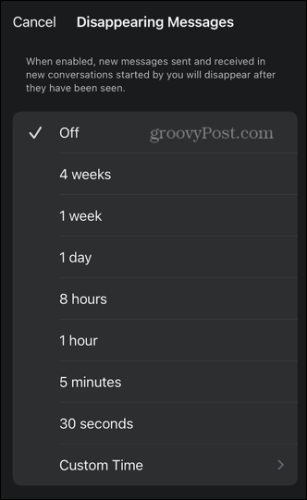
Privacy
Signal and Telegram have surged in popularity in recent years, and no more so than when WhatsApp announced that users would need to consent to share their data with Facebook, now known as Meta. People started looking for a messaging app that respected their privacy, and Telegram and Signal reaped the benefits.
Both apps gained popularity due to their stronger privacy focus compared to WhatsApp. But how do they stack up against each other? A 2021 report from the FBI is helpful in this regard.
The report listed the information that the FBI can recover from each of the most popular messaging apps. Signal came out better in this report; the FBI could only see the date that an account was registered and the last date that it was used. There was no way of accessing message content, and no information that could be used to identify you was shared. This was confirmed by a case where Signal was given a subpoena from the FBI, and this was the only data they could provide.
Telegram is less secure but doesn’t grant access to your message content. The FBI document stated that for confirmed terrorist investigations, Telegram might provide IP addresses and phone numbers to the relevant authorities, which could potentially be used to identify you.
In comparison, WhatsApp granted access to limited message content, basic subscriber records, information such as blocked users, address book contacts, other WhatsApp users who have the target of the search warrant in their address book, and the source and destination for each message.
You can also easily see the data each app collects on their respective app pages on the Apple App Store. Signal only collects contact information that isn’t linked to you.

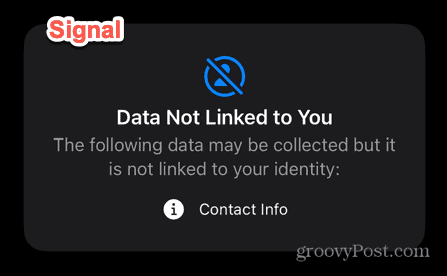
In comparison, Telegram collects information on purchases, location, contacts, identifiers, financial info, contact info, and user content, and this data is directly linked to you.

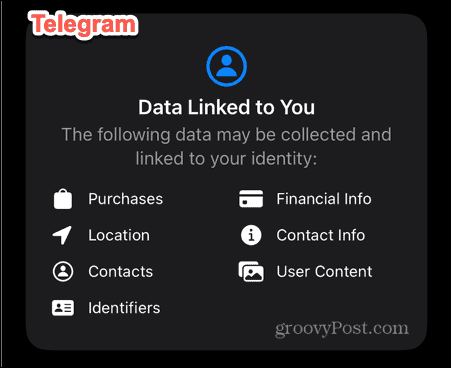
Transparency
Another important issue regarding messaging apps is how transparent they are. While WhatsApp is clear about what kinds of data it may collect, it’s not completely explicit about how it uses that data.
Signal’s server software and encryption protocol are open source, meaning anyone can inspect it and look for security flaws or malicious intent within the code. Many of Telegram’s components are open source, but the server software is not. There’s no way to see exactly what the server software does with your data or look for security flaws.
In addition, Signal runs as a not-for-profit organization, so there are fewer concerns about the potential monetization of your information. In comparison, although Telegram states that profit is not its primary focus, it does not have the structure of a non-profit organization, and money will inevitably be a focus. This brings us to our next section.
Price
Both apps are free to install and use. However, Signal offers all of its features for free. Telegram offers an optional subscription service called Telegram Premium. This grants users additional features, such as doubled limits on groups and channels, larger file uploads, faster downloads, premium stickers, animated profile pictures, custom emojis, and no ads.

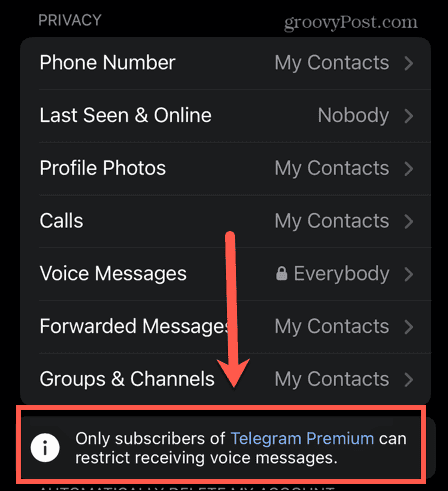
However, some key settings are only available to Telegram Premium users. For example, you cannot restrict who can send you voice messages without a Premium subscription. Unless you pay for the privilege, anyone on Telegram can send you an unsolicited voice message.
Verdict
When choosing between these two apps, the decision comes down to what is most important to you. If privacy and security are your main concerns, Signal is the best choice; you get end-to-end encryption by default, and the app doesn’t collect nearly as much of your personal information. Telegram, however, offers some features that Signal can’t, such as easy syncing across multiple devices and the possibility of creating huge groups and channels. However, these features come at the cost of lower security and privacy levels, so you’ll need to weigh up your priorities carefully.
Another key consideration has nothing to do with the apps themselves; the apps that your friends and family use. You won’t get much use out of either Signal or Telegram if none of your friends or family uses them. Your choice may ultimately come down to which app more of your contacts use.
Learn More About Messaging
If you’re comparing Signal vs. Telegram, then the chances are that you’re looking to make a move away from WhatsApp to a messaging app that treats your privacy with a little more respect. There are other options out there. However, many are significantly less secure or private than Signal and Telegram.
1 Comment
Leave a Reply
Leave a Reply













Kaly B
August 7, 2023 at 8:39 am
Very useful and informative. Thank you.